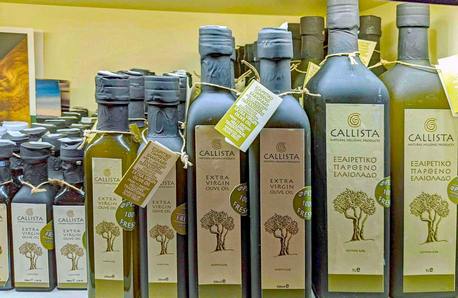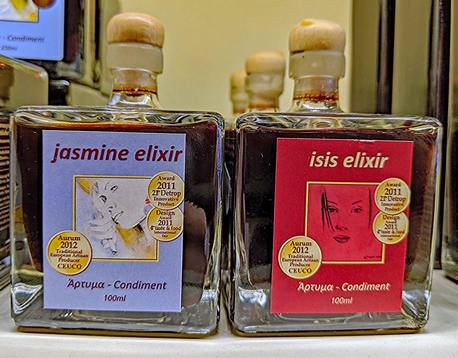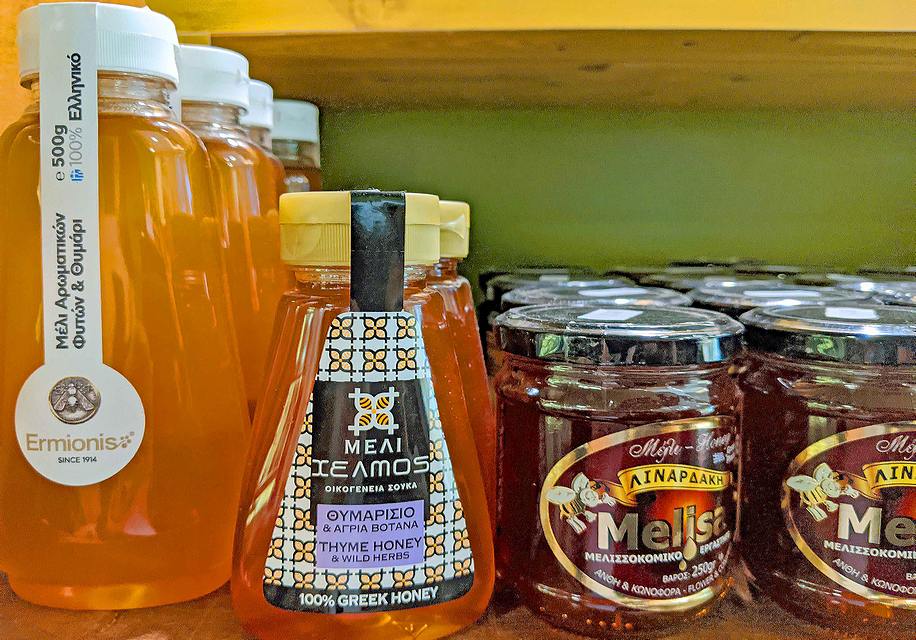We love shopping in grocery stores to look for the foods that local people use in their kitchens. That’s usually what we bring home to our own kitchen. But Athens supermarkets proved too much for us because we are illiterate in Greek. The alphabet confounded us. We can usually figure out food names in most European languages that use a Roman alphabet. Ironically, many of those food names come down from Greek. But knowing that doesn’t help when you can’t sound out the spelling. So we resorted to Pantopoleion (34 Dimitrakopolou, Athens; +30 210 325 4890; pantopwlion.gr/), a local specialty store in our neighborhood, and put ourselves in the capable hands of John Kontoyiannis, one of the owners. (That’s John behind the deli counter at the top of post). When he overheard us speaking English, he came to our aid. The store, which has another branch in Monstirakai, is a treasure trove of regional Greek specialty foods.
 John was stumped when we asked what four or five products essential to Greek cuisine should we buy to take home. ‶Only four or five?″ he said in disbelief. We pled luggage limitations and a small pantry.
John was stumped when we asked what four or five products essential to Greek cuisine should we buy to take home. ‶Only four or five?″ he said in disbelief. We pled luggage limitations and a small pantry.
He started, of course, with olive oil, which he said is ”the gold of Greece.” Kontoyiannis’s professed personal favorite was the Callista brand, which blends oil from several different heritage olives. Our taste ran to the Sitia ZARO brand from Crete, which the shop offered in two variations. The white canister held early harvest oil, which had a nice snap and bite. The black can held organic oil from slightly riper olives—smoother and more buttery.
Augmenting the suave with the tart and the sweet
 Kontoyiannis was also a big fan of some specialty balsamic vinegars—which came as a surprise to us, since we associate the product with Modena, Italy. Pantopoleion spotlights the vinegars made by the Vaimakis family, who are also winemakers. The base vinegar is aged for five years. It’s richly sweet and tangy. The family produces two variants. One is called ‶Jasmine,″ and is infused with forest fruits, spearmint, and verbena. Most Americans seem to prefer the ‶Isis″ variation, which has notes of forest fruits, peppers, and cardamom. It’s an interesting product—better for dressing meats than salads, we think.
Kontoyiannis was also a big fan of some specialty balsamic vinegars—which came as a surprise to us, since we associate the product with Modena, Italy. Pantopoleion spotlights the vinegars made by the Vaimakis family, who are also winemakers. The base vinegar is aged for five years. It’s richly sweet and tangy. The family produces two variants. One is called ‶Jasmine,″ and is infused with forest fruits, spearmint, and verbena. Most Americans seem to prefer the ‶Isis″ variation, which has notes of forest fruits, peppers, and cardamom. It’s an interesting product—better for dressing meats than salads, we think.
We thought we didn’t really need to stock up on oregano—how different could it be?—though the sniff we took from a big apothecary jar still lingers in memory as unusually pungent and resinous. And we had already bought lots of Aegina pistachios at the central market.
Every place in the world raves about its honey, and we took the praise that Kontoyiannis lavished on Greek honey with a proverbial grain of salt. Still, we did buy some heather honey and a few small jars of thyme honey—‶for me, one of the best in the world,″ he said. Alas, we didn’t try it until we got home. Had we known how spicy and complex the flavor would be, we might have filled a suitcase with it. Kontoyiannis’s judgement was on the mark.


